From Romans 4-7
 Its logical to assume someone will not do anything for their enemies, let alone die for them. But on the other hand, if there was someone good, someone valuable. Then perhaps they might think about dying for them. Today’s passage might surprise you. Paul wants his audience to know God loves them so much while they were sinners he sent Jesus to die for them. But the passage doesn’t stop with this amazing truth. It gets even better than this. Now that they have been justified and are righteous in his sight. God will do much more for them. God has been amazingly generous to them when they were sinners. Now they are righteous he will do even more.
Its logical to assume someone will not do anything for their enemies, let alone die for them. But on the other hand, if there was someone good, someone valuable. Then perhaps they might think about dying for them. Today’s passage might surprise you. Paul wants his audience to know God loves them so much while they were sinners he sent Jesus to die for them. But the passage doesn’t stop with this amazing truth. It gets even better than this. Now that they have been justified and are righteous in his sight. God will do much more for them. God has been amazingly generous to them when they were sinners. Now they are righteous he will do even more.
This post is part of my bible in a year series.
Passage and Comments
Paul has just finished his dialogue with the Jew. The point of the dialogue was to give assurance to the Romans believers they were righteous in the sight of God because they believe in Jesus. He means this especially for the Gentile believers who do not observe the works of law.
Paul is addressing the Roman Christians at Rom 5 and onwards. The following post is one example where I demonstrate Paul’s apostolic mindset in action.
[5:1] Therefore, since we have been justified by faith, we have peace with God through our Lord Jesus Christ. (Rom 5.1)
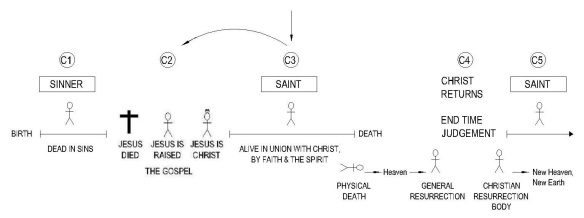 Paul is looking back to when they were justified by faith. The Greek word ‘pistis’ rendered as faith could also refer to ‘faithfulness’. That is Christ’s faithfulness (witnessed to in the law and the prophets) which lead him to the cross (cf. Rom 5.22; Phil 2.8; Heb 10.19-20).
Paul is looking back to when they were justified by faith. The Greek word ‘pistis’ rendered as faith could also refer to ‘faithfulness’. That is Christ’s faithfulness (witnessed to in the law and the prophets) which lead him to the cross (cf. Rom 5.22; Phil 2.8; Heb 10.19-20).
Paul says they have peace with God. Peace is a covenant word.
More than signalling a cessation of hostilities. It means God will go out of his way to protect and take care of us.
[2] Through him we have also obtained access by faith into this grace in which we stand, and we rejoice in hope of the glory of God. (Rom 5.2)
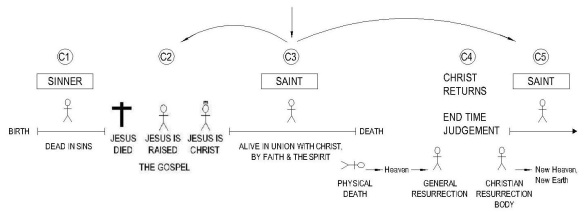 Paul looks back to when they obtained access into ‘this grace’. Paul refers to their current favoured relationship with God. They have gained this by ‘faith’. And now they rejoice, in hope of the [future] glory of God.
Paul looks back to when they obtained access into ‘this grace’. Paul refers to their current favoured relationship with God. They have gained this by ‘faith’. And now they rejoice, in hope of the [future] glory of God.
[3] Not only that, but we rejoice in our sufferings, knowing that suffering produces endurance, [4] and endurance produces character, and character produces hope, [5] and hope does not put us to shame, because God’s love has been poured into our hearts through the Holy Spirit who has been given to us. (Rom 5.3-5)
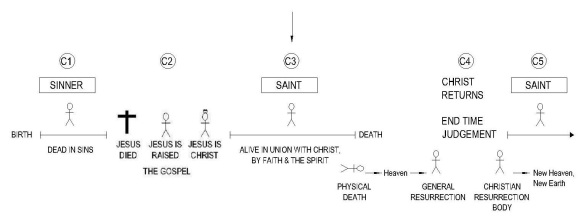 Paul is referring to their current state. God’s love works in the hearts of those whom he has sent the Holy Spirit. He links a series of benefits starting from suffering.
Paul is referring to their current state. God’s love works in the hearts of those whom he has sent the Holy Spirit. He links a series of benefits starting from suffering.
Suffering – Endurance – Character – Hope.
All these are part of the ‘grace’ they stand in and consistent with the peace they have with God. This is the process of salvation all believers go through.
[6] For while we were still weak, at the right time Christ died for the ungodly. [7] For one will scarcely die for a righteous person—though perhaps for a good person one would dare even to die—[8] but God shows his love for us in that while we were still sinners, Christ died for us. (Rom 5.6-8)
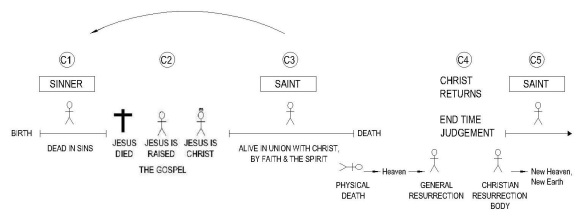 Now, Paul looks back to their former state. He sets up a continuum of people varied by their morality.
Now, Paul looks back to their former state. He sets up a continuum of people varied by their morality.
Enemies – Sinners – Ungodly … Righteous – Good.
He sets up the continuum because he wants to highlight God’s love.
The righteous and the good obviously have more value on this continuum. Because they are like this people are more likely to do good things for them. Some might even die for them.
On the other hand, those who are considered sinners or ones enemies. There is little to no chance anyone would do something good for them.
Logically people are more likely to do something for those who are righteous and good. Paul will do nothing for those who are sinners and their enemies. Or put another way, people will do much more for the righteous and good, than sinners and the wicked.
That’s the way things normally work.
But, Paul says God loves them so much, that even while they were sinners God sent Christ to die for them.
This means God has amazing love for those who do not attract it in any way.
[9] Since, therefore, we have now been justified by his blood, (Rom 5.9a)
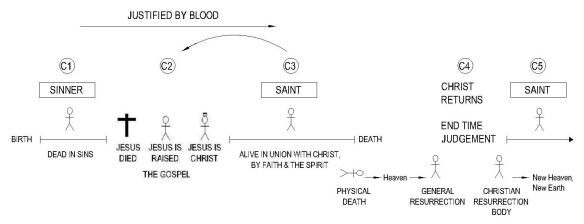 They once were sinners, now they have been justified (made righteous in his sight).
They once were sinners, now they have been justified (made righteous in his sight).
Paul looks back to when they were justified by Jesus’ blood on the cross. This is a process that moved them from C1 to C3 by C2.
Paul is implicitly referring to the continuum again (Enemies – Sinners – Ungodly … Righteous – Good). They are not sinners anymore because of what Jesus has done. They have moved along the scale. They were sinners, but now having been justified they are righteous. Righteous in the sight of God.
What does this mean for how God will now treat them?
much more shall we be saved by him from the wrath of God. (Rom 5.9b)
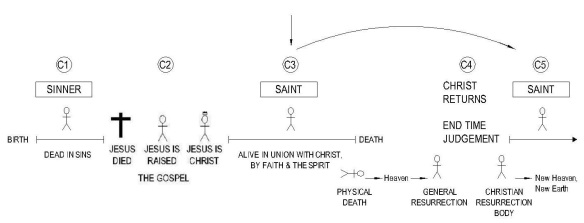 ‘Much more’. Paul says! God will do more for the righteous than he will sinners. If God is willing to send Jesus to die for them while they were sinners it’s logical to think he will do much more for them now they have been made righteous by his blood. Paul uses this expression to make a distinction between two groups or situations several times Rom 5.15, 17; 11.12, 24; 1 Cor 6.3; 2 Cor 3.11; Phil 2.12; Philem 16; cf. Heb 3.3; 8.6; 9.14; 12.9).
‘Much more’. Paul says! God will do more for the righteous than he will sinners. If God is willing to send Jesus to die for them while they were sinners it’s logical to think he will do much more for them now they have been made righteous by his blood. Paul uses this expression to make a distinction between two groups or situations several times Rom 5.15, 17; 11.12, 24; 1 Cor 6.3; 2 Cor 3.11; Phil 2.12; Philem 16; cf. Heb 3.3; 8.6; 9.14; 12.9).
In light of the justifying event (C2), Paul now looks to their present and forward to their future judgement. God’s wrath can be experienced in the present (e.g. Rom 1.18f) and in the end times (Rom 2.5), so I’ve drawn arrows to the present times and future respectively.
In both cases they will be saved by Jesus from the wrath of God.
There is a much more to hope for in the future. Wrath may be coming, but because of the change Jesus death has effected in them, because they are now righteous in his sight they are all the more likely to be saved from it.
[10] For if while we were enemies we were reconciled to God by the death of his Son, (Rom 5.10a)
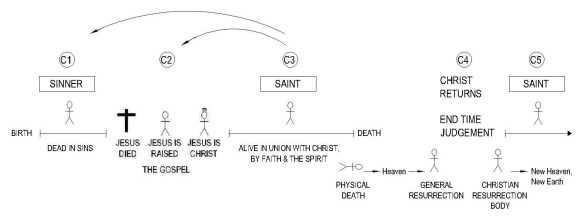 Paul implicitly refers to the continuum again (Enemies – Sinners – Ungodly … Righteous – Good). Paul looks backward to when they were enemies with God. This is also when they were sinners. Paul then points to the event of reconciliation with God, effected by Christ’s death.
Paul implicitly refers to the continuum again (Enemies – Sinners – Ungodly … Righteous – Good). Paul looks backward to when they were enemies with God. This is also when they were sinners. Paul then points to the event of reconciliation with God, effected by Christ’s death.
much more, now that we are reconciled, shall we be saved by his life. (Rom 5.10b)
 ‘Much more’. Paul says again. Now that they are reconciled and are God’s friends. God will save them by Jesus life. So its the same point all over again.
‘Much more’. Paul says again. Now that they are reconciled and are God’s friends. God will save them by Jesus life. So its the same point all over again.
If God sent Jesus to die for them while they were sinners, now that they have been justified and made righteous they can expect He will do much more for them.
If God sent Jesus to reconcile them by his death while they were enemies, they can expect He will do much more for them now they are friends.
Paul now looks to their present and forward to their future judgement. In both cases they will be saved by Jesus’ life. Similarly to wrath, I believe the salvation Paul expresses here can refer to both present and end time salvation. Hence again, C3 and C5 arrows.
[11] More than that, we also rejoice in God through our Lord Jesus Christ, through whom we have now received reconciliation. (Rom 5.11)
 Even more than being saved Paul urges them to rejoice in God. To boast in him, to glorify in him. So now they rejoice through Jesus Christ, because they have received reconciliation.
Even more than being saved Paul urges them to rejoice in God. To boast in him, to glorify in him. So now they rejoice through Jesus Christ, because they have received reconciliation.
Words for Believers

God loves you. He loves you so much he sent Jesus to die for you when you were a sinner. But now through Jesus death on the cross he has made you righteous in his sight.
God loves you and now you are righteous. In light of what he has done for you in the past, now that you are righteous in his sight, you can expect he will do even more for you in the future.
This is a wonderful passage that speaks of God’s love for us and gives a lot of assurance. Do not doubt God loves you. Eagerly anticipate the myriad of ways in which he will express that love in your future.
Copyright © Joshua Washington and thescripturesays, 2015. All Rights Reserved.

